Guide to Buying Boilers
Buying a boiler system for a house means investing in better comfort and quality of life. The right boiler will keep the living space warm during the colder months, contribute to managing the house’s energy costs, and reduce its environmental impact. But buying a boiler can be slightly confusing. There are various systems, sizes, and features.

What is a boiler?
A boiler is an appliance used for central heating in homes. It works by heating water in a tank, like a conventional water heater. The water is then distributed through a network of pipes to all the radiators in the house. Based on the type of boiler, it will be heated to steam or be in a liquid state. In both cases, the boiler can be powered by any fuel source, such as natural gas, propane, heating oil, or electricity. While buying a boiler, it is important to get one that is compatible with the Raiders. This is because radiators are designed to work with either steam or hot water, not both.
Types of boilers
To choose the right boiler, one must know the various types available. Each type is designed to meet different preferences and needs. Here are some of the common types of boilers and their features.
- Combi (combination) boilers
T hese boilers can do two things with one unit: provide heating as well as hot water. So, there is no need to purchase a separate tank for hot water. One does not need to have a water cylinder to get instant hot water on demand. As a result, such boilers are compact and efficient, making them perfect for homes that are small in size. Besides, these boilers are known to be highly energy efficient since the water is heated only when required. On the downside, the compact size means the flow rate is quite limited. The water pressure further goes down if several taps are used at the same time. So, it might be suitable for homes that have high hot water demand or multiple bathrooms. - System boilers
Such boilers need a cylinder to store the hot water. But there is no need for a separate tank to collect the cold water. This makes system boilers quite easy and simple to install. The main benefit of these boilers is that they are capable of storing a steady supply of hot water that is ready for instant use. So, these can easily provide hot water to several taps at once without any drop in water pressure. Besides, these are more energy efficient compared to conventional boilers, as they do not lose any heat from the hot water tank. The only negative aspect of these boilers is that they need more space compared to combi boilers. This is because of the need for a hot water cylinder. - Conventional (regular) boilers
These types of boilers require a cold-water tank and a separate hot-water cylinder. A bit bigger than other types of boilers, conventional ones are usually used in houses with older radiator systems. Ideal for larger homes, these boilers can simultaneously deliver a large amount of water to multiple taps. The only downside is that conventional boilers need time to reheat the water. Sometimes, the hot water runs out, so hot water on demand is not always possible.
Types of fuel options
Boilers are further categorized based on the type of fuel they use. When selecting a boiler for the home, it is important to pay attention to the fuel options as well. The fuel that the boiler will use has a direct effect on operating costs, installation, energy consumption, and environmental impact.
- Gas boilers
One of the most commonly and widely used boilers, these require a connection to the gas mains to operate efficiently. In fact, gas boilers are generally considered standard for home heating requirements. They are also cheaper than electric boilers. Besides this, the latest condensing gas boiler models have become popular for offering high energy efficiency. The only problem with gas boilers is that they need periodic safety checks and maintenance to avoid the risk of gas leakage. Also, these boilers can only be used in areas that have a gas network. - Oil boilers
These are great options for homes that do not have access to a gas network. Needing only an extra tank to store the oil, these types of boilers are known for being efficient and highly reliable. In addition, these are quite cost-effective to run, particularly in areas where oil prices are low and competitive. However, the frequently fluctuating oil prices can have a direct effect on running costs. - Electric boilers
These boilers use electricity to generate hot water. They are perfect for areas without access to oil or gas. Besides, electric boilers are smaller in size and can be placed anywhere inside the house.
Costs
The cost of a boiler generally depends on several factors, such as size, type, and the installation process. Generally, boiler installation costs can range from around $4,000 to over $15,000. This price may seem quite expensive. However, since a boiler that is installed properly runs for about 15 to 20 years, the high price is worth it. Besides this, boiler replacement costs can range between $1,200 and $16,000.


